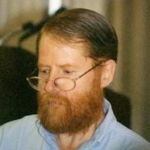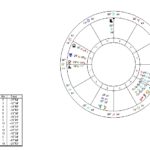Robert Zoller was an unforgettable character. Despite his focus on Medieval astrology, I always thought of him as a Renaissance man. He liked to call himself a “rogue scholar,” but was also a linguist, dowser, sketch artist and high-wire telephone electrician, as well as a man of extremes. Mild-mannered and modest, he could also be rather opinionated and even imperious (he claimed descent from Irish royalty). Outwardly a regular guy with a light New York accent, his work could be overly intellectual (consider a lecture entitled, “The Role of Hermes as Teacher, Initiator, Heirophant and Psychopomp”). A predictive astrologer, he probably leaned closer to the Fate side of the spectrum than many, yet as an adult he became a Lutheran (a Christian faith with an ideology based on Free Will).
 Bob was a footloose vagabond who loved travel and could casually converse in Spanish with NYC waiters. A compelling speaker, his fame in the 1990s followed his translations of Hermes Trismegistus, Al Kindi and Guido Bonatti, and he sometimes lectured to standing-room-only crowds. He may be best remembered for his World Trade Center attack forecast, and while not hitting all the specifics (who could?), it was published in advance and sent to his subscription list in 1999 and 2000.
Bob was a footloose vagabond who loved travel and could casually converse in Spanish with NYC waiters. A compelling speaker, his fame in the 1990s followed his translations of Hermes Trismegistus, Al Kindi and Guido Bonatti, and he sometimes lectured to standing-room-only crowds. He may be best remembered for his World Trade Center attack forecast, and while not hitting all the specifics (who could?), it was published in advance and sent to his subscription list in 1999 and 2000.
With no earth in his horoscope, Zoller was not very concerned about the material plane (something he probably thought an “infinite regress”). He lived simply and delved deeply into magic, meditation and spirituality. He argued that “Spirituality is a Saturn trip,” as he considered it involved more renunciation than Jupiterian expansion. He believed in angels and other beings not because the Bible told him so, but because he had experienced them first-hand.
While I had little use for the laborious Medieval astrological calculations he was attached to, I visited the Masonic Library in New York at his request, and accompanied him to W.D. Gann’s grave in Brooklyn (which I’m convinced he psychically found as we had little in the way of a map for guidance). He gave me the opportunity to turn the parchment pages of a 15th century Latin manuscript at the New York Public Library.
Bob’s outlook lay somewhere between radical libertarian and ultraconservative, but it would be wrong to categorize him. He shared subversive 1970s counter-culture classics. He didn’t vote as he felt that election results were pre-ordained. He’d calculate death dates on request from clients (to within 5 or 10 years), though he also felt that in astrological prediction, “If you’re getting 75%, you’re doing really well.” He scoffed at the ideas of evolution or alien UFOs. He suggested he was the reincarnation of Evangeline Adams, as they shared some similar horoscope placements and more than a passing physical resemblance. But as he relished both the profundity of life as well its absurdities, I was never certain whether or not he was joking.
With a consciousness always attuned to the cosmos, I trust that Bob Zoller is now off on another one of his audacious adventures.
Robert Zoller had a number of self-published books, though his one traditionally published title, the Arabic Parts in Astrology: A Lost Key to Prediction is still available at Amazon.com.
About my Amazon links.

